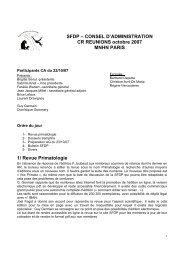universiteit antwerpen - European Federation for Primatology ...
universiteit antwerpen - European Federation for Primatology ...
universiteit antwerpen - European Federation for Primatology ...
You also want an ePaper? Increase the reach of your titles
YUMPU automatically turns print PDFs into web optimized ePapers that Google loves.
<strong>universiteit</strong> <strong>antwerpen</strong> - <strong>European</strong> <strong>Federation</strong> <strong>for</strong> <strong>Primatology</strong> meeting 2013 - Scientific Programme 10/06/2013<br />
Inhoudsverantwoordelijke(n) : josie.meaney kristiaan.daout<br />
Friday 13 th September 2013<br />
Symposium 9: What primates can tell us about the origins of language<br />
· Organiser :<br />
o Adri e n Me gue rdi tchi a n (CNRS, Ai x-Ma rs e i l l e Uni ve rs i ty, FR)<br />
· Abstract :<br />
Be ca us e nonhuma n pri ma te s a re phyl oge ne ti ca l l y cl os e to huma ns , re s e a rch on our cous i ns mi ght he l p provi di ng cl ue s <strong>for</strong> re cons tructi ng the fe a ture s of our<br />
a nce s tra l communi ca ti ve s ys te ms . Thus , a pri me que s ti on <strong>for</strong> pri ma tol ogi s ts i s to i nve s ti ga te whe the r e vol uti ona ry pre curs ors of s ome l a ngua ge prope rti e s ma y be<br />
found i n the communi ca ti ve s ys te ms a nd be ha vi ours of nonhuma n pri ma te s . On the ba s i s of s ome e vi de nce of rudi me nta ry s ynta cti c rul e s , a udi e nce e ffe ct,<br />
re fe re nti a l prope rti e s a nd s ome de gre e of fl e xi bi l i ty found i n the voca l s ys te m, s ome re s e a rche rs ha ve s ugge s te d tha t l a ngua ge re s ul te d from the e vol uti on of the<br />
voca l s ys te m i n our a nce s tors . Thi s the ory i s oppos e d to a “ge s tura l ori gi ns ” vi e w of how l a ngua ge mi ght ha ve e vol ve d. Inde e d, s ome a uthors be l i e ve tha t the re i s<br />
more convi nci ng e vi de nce of conti nui ti e s be twe e n the ge s tura l s ys te m of nonhuma n pri ma te s a nd s ome l a ngua ge prope rti e s s uch a s fl e xi bi l i ty of l e a rni ng a nd us e ,<br />
i nte nti ona l a nd re fe re nti a l prope rti e s . Othe r re s e a rche rs ha ve s poke n <strong>for</strong> a mul ti moda l a pproa ch on pri ma te communi ca ti on to be tte r i nve s ti ga te the pote nti a l<br />
i nte gra te d communi ca ti ve s ys te m tha t l e d to huma n s pe e ch. In the pre s e nt s ympos i um, wi thi n a compa ra ti ve a nd e vol uti ona ry fra me work a bout communi ca ti on i n<br />
pri ma te s , a pa ne l of e xpe rts of the fi e l d wi l l re vi e w a nd di s cus s re ce nt fi ndi ngs re l a te d to the fe a ture s of voca l a nd ge s tura l s ys te m, the i r bra i n corre l a te s a nd the i r<br />
pote nti a l conti nui ti e s wi th s ome l a ngua ge prope rti e s .<br />
· Topics :<br />
o Cogni ti on; La ngua ge ; Be ha vi our<br />
Symposium 10: The ecology of culture: The influence of ecology on innovation, social learning, and thus culture<br />
· Organisers :<br />
o Ka the l i jne Koops (Uni ve rs i ty of Ca mbri dge , UK)<br />
o El i s a be tta Vi s a l be rghi ;<br />
o Ca re l va n Scha i k (Uni ve rs i ty of Zuri ch, SW)<br />
· Abstract<br />
The probl e m to da te of docume nti ng a ni ma l cul ture i n the wi l d i s tha t s tudi e s ha d to re l y a l mos t e xcl us i ve l y on the ‘e thnogra phi c me thod’ (or ‘me thod of e xcl us i on’)<br />
to e s ta bl i s h the pre s e nce of cul ture i n wi l d a ni ma l popul a ti ons . Thi s me thod i nvol ve s cons e rva ti ve ge ogra phi c compa ri s ons , s i nce popul a ti on di ffe re nce s corre l a te d<br />
wi th cl e a r ge ne ti c or ha bi ta t di ffe re nce s a re e xcl ude d. The e thnogra phi c a pproa ch thus ri s ks mi s s i ng out ma ny cul tura l va ri a nts i n na ture . It a l s o pote nti a l l y l e a ds to<br />
a cons i de ra bl e bi a s i n the docume nte d conte nt of cul ture . Ecol ogi ca l condi ti ons a l s o i nfl ue nce cul tura l proce s s e s , but ove ra l l the y ha ve re ce i ve d l i ttl e a tte nti on i n<br />
s tudi e s on a ni ma l cul ture . He nce , thi s s ympos i um s e ts out to e xpl i ci tl y a ddre s s the rol e of e col ogy on i nnova ti on, s oci a l l e a rni ng a nd cul ture . The s ympos i um<br />
hi ghl i ghts the i mporta nce of cons i de ri ng e col ogi ca l fa ctors whe n s tudyi ng a ni ma l cul ture a nd e mpha s i ze s the i nte rpl a y be twe e n the e nvi ronme nt a nd cul tura l<br />
proce s s e s . It i ncl ude s contri buti ons from re s e a rch on tool -us i ng a pe s (i .e . ora ng-uta ns , chi mpa nze e s ), monke ys (i .e . ca puchi ns , l ong-ta i l e d ma ca que s ) a nd bi rds (i .e .<br />
wood-pe cke r fi nche s ) to s he d l i ght on the i mporta nce of e nvi ronme nta l condi ti ons i n s ha pi ng a ni ma l cul ture .<br />
· Topics<br />
o Be ha vi oura l e col ogy; Cul ture ; Ecol ogy<br />
http://www.ua.ac.be/main.aspx?c=.EFP2013&n=108860 3 / 3



